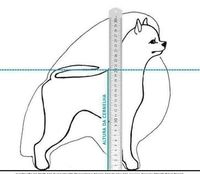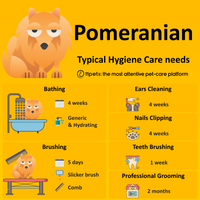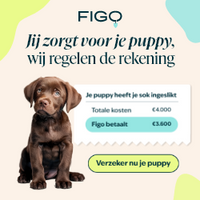The Pomeranian Breed 🐾
Complete Guide to the Mini Bearface Pomeranian
Discover the Mini & Bearface Pomeranian — breed characteristics, care, and health information from an experienced Dutch breeder.
Welcome to Pomeranian Residence, where passion and knowledge come together to breed healthy, beautiful, and loving Pomeranians. This page offers everything you need to know about the breed — from appearance and character to coat care, nutrition, and responsible ownership.
Breed Characteristics ✨
The Pomeranian (also known as the Zwergspitz or Dwarf Spitz) is a small, intelligent, and confident companion.
Despite their size, they have the heart of a big dog — lively, alert, and loyal.
Main breed features:
- Head: wedge-shaped with small, upright ears and a short muzzle.
- Body: compact and balanced, giving an elegant appearance.
- Coat: thick double coat with a soft underlayer and glossy outer coat.
- Tail: carried high and curled over the back.
- Expression: intelligent, cheerful, and full of character.
Their confident stance and playful energy make Pomeranians truly irresistible companions.
Color Variations 🎨
Pomeranians come in a variety of stunning shades, including: Orange, Cream, Cream Sable, Black & Tan, White, Wolf Gray, Merle, and Parti Color. Each color gives the dog a unique look — no two are ever the same.
At Pomeranian Residence, we specialize in the Bearface type with thick, fluffy coats and compact proportions.
Our lines include Orange Sable, Cream, and Merle Bearface Pomeranians.
(Insert image of color variations here with alt text: “Pomeranian color variations – Orange, Cream, Merle, White and Black & Tan”)
Size & Weight 📏
According to the breed standard, the average shoulder height of a Pomeranian is 21 cm, with a small margin of 3 cm up or down.
Weight typically ranges between 2 and 4 kg, depending on body structure and gender.
Most of our Mini Bearface Pomeranians remain between 18 and 21 cm, with a balanced build that ensures both beauty and health.
Coat Care & Grooming 🧴
When your Pomeranian puppy leaves for its new home, it already has a soft, fluffy coat.
Proper coat care is vital for both appearance and wellbeing.
- Brush your Pomeranian 2–3 times per week to prevent tangles and matting.
- Use a gentle brush suitable for double-coated breeds.
- Trim the hair around the feet if necessary.
- Bathe only once every 3–4 weeks with a mild puppy shampoo and conditioner.
Brushing removes loose hairs, stimulates blood circulation, and keeps the coat shiny and healthy.
(Insert image with alt text: “Grooming a Pomeranian puppy with a soft brush – coat care routine.”)
Behavior & Training 🧠
The Pomeranian is intelligent, curious, and eager to please — but also confident and a bit stubborn.
Training should always be positive and consistent.
- Reward good behavior with praise or a small treat
- Keep training sessions short and varied to hold their attention.
- Never shout — a firm “No” in a calm tone is enough.
- Early socialization is key: expose your puppy to new sounds, people, and other dogs.
Pomeranians are naturally alert and will bark to warn of strangers, but with good training, they quickly learn when it’s appropriate.
House Training 🚾
Most of our puppies are already familiar with puppy pads before leaving our home. When your puppy arrives, maintain a clear daily routine and praise them whenever they use the correct spot. Gradually introduce outdoor potty breaks after meals and naps. Patience and consistency are crucial — never punish mistakes. With time, your Pomeranian will become perfectly house-trained.
Nutrition & Feeding 🍽️
A Pomeranian puppy grows rapidly during the first six months, so proper nutrition is essential. We recommend high-quality, small-breed dog food designed for growth and vitality.
Key feeding tips:
- Provide clean water at all times.
- Avoid frequent changes of food.
- Feed small portions several times a day.
- Never feed human foods such as sausage, bread, sweets, cheese, or salty snacks.
As a general guide:
- Up to 4 months → 4 meals per day
- 4 to 12 months → 3 meals per day
- After 1 year → 2 meals per day
At Pomeranian Residence, we use premium nutrition and provide every new owner with personal feeding advice.
Health & Craniofacial Ratio (CFR) 💖
The Craniofacial Ratio (CFR) measures the proportion between the skull and muzzle. A healthy CFR helps prevent breathing issues and dental problems. We carefully measure the CFR of all our dogs — none of our breeding Pomeranians fall within the “red zone” of risk. This guarantees the correct Bearface structure without compromising the dog’s health.
Responsible Puppy Purchase 🌍
Choosing a puppy from a trusted breeder is crucial. Puppies from unverified sources (e.g. one-time litters or online sellers) often lack proper socialization, health checks, or official documentation.
At Pomeranian Residence, every puppy is:
- Raised in a home environment
- Fully vaccinated and microchipped
- Health-checked by a certified veterinarian
- Socialized before leaving at a minimum of 8 weeks
We also warn against illegal imports disguised as EU puppies. Only pups with valid EU Rabies Titer Tests and documents from recognized laboratories can legally enter the EU.
Why Insure Your Pomeranian? 🐶
Pomeranians are small but can have special medical needs such as dental care or patella issues. With a pet insurance plan, you’re protected from unexpected veterinary costs. Through our partner FIGO, each puppy leaves with 1 month of free pet insurance, giving you peace of mind right from the start.
Learn More 📞
Would you like more information about the Pomeranian breed or our available puppies?
Feel free to contact us or visit our Blog & News page for updates and new litters.
📍 Location: Heerlen, Netherlands
📧 info@pomeranianresidence.nl
📱 +31 6 48 411 278
🌐 www.PomeranianResidence.nl



